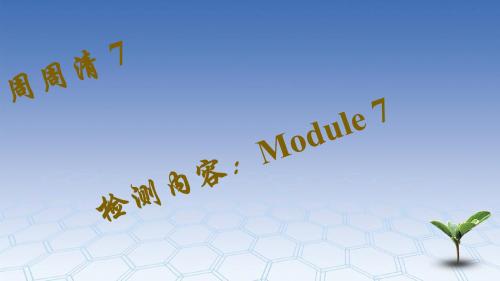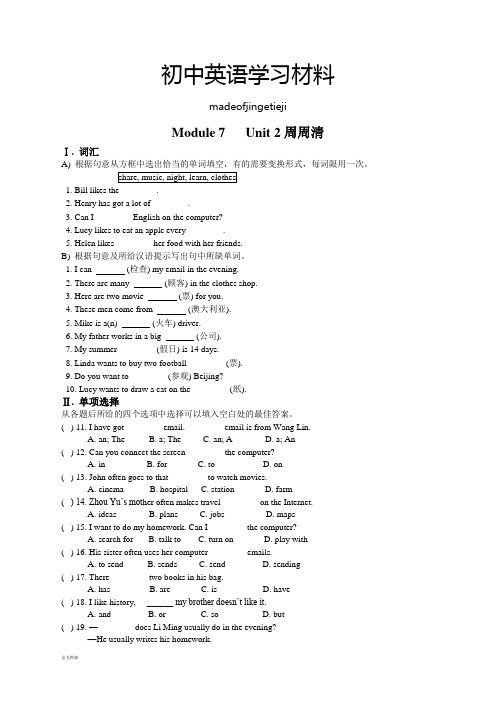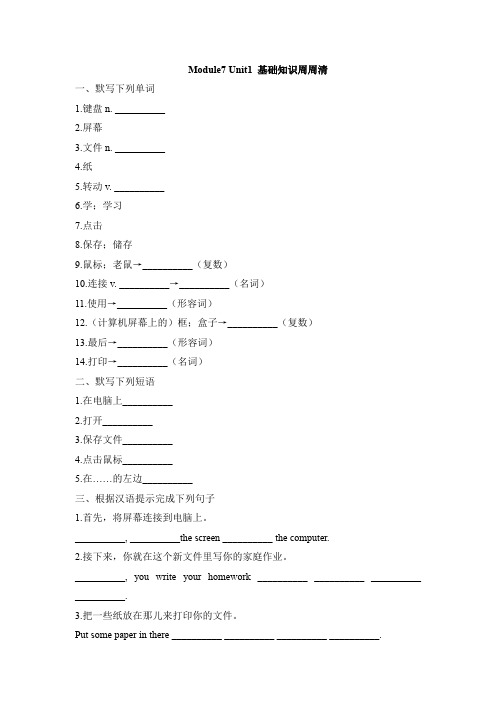Module 7重点知识周周清
- 格式:doc
- 大小:40.00 KB
- 文档页数:2


初中英语学习材料madeofjingetiejiModule 7 Unit 2周周清Ⅰ. 词汇A) 根据句意从方框中选出恰当的单词填空,有的需要变换形式,每词限用一次。
share, music, night, learn, clothes1. Bill likes the ________.2. Henry has got a lot of ________.3. Can I ________ English on the computer?4. Lucy likes to eat an apple every ________.5. Helen likes ________ her food with her friends.B) 根据句意及所给汉语提示写出句中所缺单词。
1. I can (检查) my email in the evening.2. There are many (顾客) in the clothes shop.3. Here are two movie (票) for you.4. These men come from (澳大利亚).5. Mike is a(n) (火车) driver.6. My father works in a big (公司).7. My summer ________ (假日) is 14 days.8. Linda wants to buy two football ________ (票).9. Do you want to ________ (参观) Beijing?10. Lucy wants to draw a cat on the ________ (纸).Ⅱ. 单项选择从各题后所给的四个选项中选择可以填入空白处的最佳答案。
( ) 11. I have got ________ email. ________ email is from Wang Lin.A. an; TheB. a; TheC. an; AD. a; An( ) 12. Can you connect the screen ________ the computer?A. inB. forC. toD. on( ) 13. John often goes to that ________ to watch movies.A. cinemaB. hospitalC. stationD. farm( ) 14. Zhou Yu’s mot her often makes travel ________ on the Internet.A. ideasB. plansC. jobsD. maps( ) 15. I want to do my homework. Can I ________ the computer?A. search forB. talk toC. turn onD. play with( ) 16. His sister often uses her computer ________ emails.A. to sendB. sendsC. sendD. sending( ) 17. There ________ two books in his bag.A. hasB. areC. isD. have( ) 18. I like history, ________ my brother doesn’t like it.A. andB. orC. soD. but( ) 19. —________ does Li Ming usually do in the evening?—He usually writes his homework.A. HowB. WhyC. WhatD. When( ) 20. —Your dress is very nice!—________.A. Not at allB. Yes, of courseC. All rightD. Thank youⅢ. 根据汉语意思完成英语句子,每空一词1. 每个星期六晚上,我给我的朋友们发电子邮件。

八年级英语周周清Module 7一、单项选择( )1. —What do you often have for _____ breakfast?—_____ glass of milk and some bread.A. /; AB. the; AC. a; TheD. /; The( )2. —Look! How beautiful that blue coat is!—Yes. But it’s _____ expensive.A. a bit ofB. a lot ofC. a bitD. a few( )3. The winter holiday usually _____ for nearly a month and we often have a good time.A. waitsB. goesC. lastsD. keeps( )4. —I have made _____ with my English after a year’s hard work.—Congratulations!A. great progressesB. a great progressC. great progressD. an great progress ( )5.—What do you think of Mike?—A nice boy! _____a monitor, he not only studies hard but also likes helping his classmates.A. ForB. ToC. WithD. As( )6.I’m not sure if I can have a party next weekend, because it ________ the weather.A. stands forB. depends onC. agrees withD. lives on( )7.—Mum, look! My trousers _____ too short. Can you buy me a new _____?—OK.A. is; oneB. are; onesC. are; pairD. is; pair( )8. The boy _____ his friends was playing in the street when the earthquake happened.A. withB. andC. as wellD. as far as( )9.—Please _____ the form, and you can deposit (储存) your money in this bank.—OK. Thank you, sir.A. pay forB. check inC. pick upD. fill out( )10. How dangerous! She was driving the car with one hand and holding an ice cream with _______.A. the otherB. anotherC. othersD. other11.It’s too late . You’d better ________at once .A . leaveB . to leaveC . leavingD . leaves12. Be careful , _____ you will fall off the bike .A . and B. but C . so D . Or13.Helen’s sister is _____________- to go to school .A .enough oldB .old enoughC .young enoughD .enough young14.They didn’t provide me ______ food . so I had to find something to eat .A .forB .with C. about D. to15.He couldn’t help __________ when the girl saw her mother .A . to cryB . cryC . criedD . crying二、完形填空(每小题1分,共10分)In learning English,one should first pay attention to listening and speaking.It is the groundwork of reading and writing.You'd better 1 your best to speak while you do much listening.Don't be 2 of making mistakes.But be careful not to let them stop you from improving your 3 .While you are doing this,a good 4 is to write——keep a diary,write notes or letters.Then if you can,ask some others to go through 5 you have written and tell you where it is wrong.Many mistakes in your speaking will be 6 found when you write.Through correcting mistakes,you can do better in learning English.If you are slow in speaking,don't 7 about it.One of the helpful ways is reading,either aloud or to yourself.The important thing is to choose 8 to read.It mustn't be too difficult foryou.When you are reading 9 this way,don't stop to 10 the new words if you can guess their meanings when they have nothing to do with the sentences.You can do that some other time.1.A.have B.send C.make D.try2.A.sure B.afraid C.proud D.tired3.A.English B.Chinese C.Japanese D.French4.A.start B.idea C.way D.manner5.A.how B.when C.why D.what6.A.happily B.easily C.really D.slowly7.A.talk B.fear C.worry D.hurry8.A.something interesting B.interesting somethingC.anything interesting D.nothing interesting9.A.by B.on C.at D.in10.A.look at B.look for C.look up D.look over三、阅读理解(每小题2分,共20分)AFrom: Joe @ To: Jane @ Subject: Help!To: Joe @( ) 1. What is Joe’s probl em in the first e-mail?A.Joe made Rena unhappy and he felt very sadB.Joe’s classmate, Rena, sent Beth an e-mail and made her unhappy.C.Joe received a wrong e-mail from Rena and became angry.D.Joe’s friend, Beth, is unhappy because Joe sent her an angry e-mail.( ) 2. After Rena’s feeling got hurt, what did Joe do?A.He sent an e-mail and said sorry to her.B.He asked Beth what he should do.C.He sent an e-mail to Aunt Jane for helpD.He said sorry to Rena face to face.( ) 3. What does the underlined sentence mean in the second e-mail?A. Because you don’t know who will get your e-mail at last.B. Because you can never know where your e-mail was written.C. Because you don’t know who the e-mail is forD. Because you never know where the message is from.( ) 4. What advice did Jane give Joe?A. Joe, Beth and Rena should have a talk together.B. Joe should wait for some time before saying sorry to Rena.C. Joe should ask Beth to explain it to Rena.D. Joe should say sorry to Rena, and then send her some flowers.( ) 5.From the e-mails we know that ____________.A Joe, Rena and Beth study at different schoolsB. Beth didn’t forward the message to Rena.C. Joe has sent beautiful flowers to Rena.D. Rena is still angry with Joe.四、单词拼写。

Module7 Unit1 基础知识周周清一、默写下列单词1.键盘n. __________2.屏幕3.文件n. __________4.纸5.转动v. __________6.学;学习7.点击8.保存;储存9.鼠标;老鼠→__________(复数)10.连接v. __________→__________(名词)11.使用→__________(形容词)12.(计算机屏幕上的)框;盒子→__________(复数)13.最后→__________(形容词)14.打印→__________(名词)二、默写下列短语1.在电脑上__________2.打开__________3.保存文件__________4.点击鼠标__________5.在……的左边__________三、根据汉语提示完成下列句子1.首先,将屏幕连接到电脑上。
__________, __________the screen __________ the computer.2.接下来,你就在这个新文件里写你的家庭作业。
__________, you write your homework __________ __________ __________ __________.3.把一些纸放在那儿来打印你的文件。
Put some paper in there __________ __________ __________ __________.4.我想要学习怎样打印一份文件。
I want to learn __________ __________ __________ a __________.四、用方框中所给词的适当形式填空can __________ my father's computer on Sunday.a long walk, __________ he arrives(到达)at the station.great bridge __________ the two cities.are two little __________ in the cage.5.—What are they in these __________—Some coats.6. __________is one of the most important inventions(发明).参考答案一、1~8.略; mice ; connection ; useful ; boxes ; final ; printing二、the computer on the document the mouse the left of三、; connect; to; in the new document print your document to print document 四、。

山东省新泰市第二中学高中英语模块七周清2基础操练Ⅰ. 单词拼写1. As he has no opportunity to achieve his a , he intends to resign from the company.2. When something can help people or improve their live s, we say it isb to people.3. I’m afraid it’ll be very hard for you to a this story for children.4. You’d better not get a at his ignorance.5. The manager (管理) his business carefully.6. Finland gained (独立) from Russia during the First World War.7. I’m interested in the classic al (文学) of France.8. We must give (帮助) to the elderly.9. A (伙伴) is a friend that you spend a lot of time with, or someone you are traveling with.10. I offer you my hearty (祝贺).提升练习单项填空21. —Hello, Jane. I come t o say goodbye to you. I’ll start a new job in anothercompany.—_______.A. Oh, no problemB. Oh, enjoy yourselfC. Oh, all the bestD. Oh, have a happy day22. Susan may come to see me tonight. I don’t want to go out ________ shecomes.A. as thoughB. in caseC. even ifD. so that23. _______ his disability, he did it very well. Please don’t scold him.A. ConsideringB. ConsideredC. To considerD. Being considered24. Marty _______ have kept his word. I wo nder why he changed his mind atlast.A. shouldB. mustC. needD. May25. He became _________ his parents because he could make a living by sellingnewspapers.A. tired ofB. independent ofC. accustomed toD. accessible to26. Susan has difficulty wit h her _________. She can’t see things clearly.A. brainB. muscleC. eyesightD. strength27. The new teacher was very quick to _________ the rules of the schoolA. adapt toB. addict toC. concentrate onD. depend on28. The hearings and comments often help managers avoid harmful decisions,leading them toward more _______ choices.A. usefulB. beneficialC. importantD. influential29. He has been on business, so I have to deal with all the letters during his_____.A. appearanceB. distanceC. absenceD. presence30. The train had left, so we could do nothing but ________ another.A. waitB. to waitC. waitedD. waiting31. John is a Londoner; ________, he lives in London.A. in other wordsB. on the one handC. in a wordD. on the other hand32. This disaster ______ that people had no knowledge of first aid and theyhadn’t known how to protect themselves in face of danger.A. led toB. contributed toC. resulted inD. lay in33. His angry look suggested that what I said just now _____ him.A. annoyingB. annoyedC. amusingD. amused34. The boy wanted to play games at home but his mother told him__________.A. not toB. not to doC. not do itD. don’t do35. I worked so late in the office that I had difficulty ______ the last bus.A. to have caughtB. catchingC. to catchD. caught36. He hurried to the station only _______ that the train had left.A. to findB. findingC. foundD. to have found37.—— Mum, why do you give me so much popcorn?—— __________ the boring time.A. To killB. KillingC. KillD. Killed阅读理解This is a song millions of Americans will hear this New Year’s Eve. It is called Auld Lang Syne (《友谊地久天长》). It is the traditional music played during the New Year’s celebration. Auld Lang Syne is an old Scottish poem. It tells about the need to remember old friends.The words “auld lang syne” mean “old long since”. No one knows who wrote the poem first. However, a version by Scottish poet Robert Bums was published (出版) in 1796. The words and music we know today first appeared in a songbook three years later.The song is played in the United States mainly on New Year’s Eve. The version (译文) you are hearing today is by the Washington Saxophone Quartet. As we end our program with Auld Lang Syne. I would like to wish all of our radio friendsa very Happy New Year! This is Buddy Thomas.1. Where is this passage from?A. A newspaper.B. A magazine.C. A TV program.D. A radio pro gram.2. Who is introducing Auld Lang Syne to us?A. Robert Bums.B. The Washington Saxophone Quartet.C. Buddy Thomas.D. The passage doesn’t tell us.3. When is Auld Lang Syne mainly played in the USA according to thepassage?A. On New Year’s Eve.B. On Christmas Eve.C. On weekends.D. On holidays.4. When did the words and music of Auld Lang Syne we know today firstappear?A. In 1790.B. In 1793.C. In 1796.D. In 1799.5. What’s Auld Lang Syne about?A. It’s about the history of Scotland.B. It’s about an old Scottish poet.C. It’s about the need to remember old friends.D. It’s about the wishes to the radio friends.完形填空Dante Gabriel Rossetti, the famous 19th-century poet and artist, was once called on by an elderly man. The old fellow had some sketches(素描) and ___36____ that he wanted Rossetti to __37__ and tell him if they were any good, or if they at least showed ___38___ talent.Rossetti looked them over ___39____. After the first few, he knew that they were ___40__, with no ___41___ of artistic talent. But Rossetti was a kind man, and he told the elderly man as ___42__ as possible that the pictures were without much value and showed __43___ t alent. He was sorry, __44__ he could not lie tothe man.The visitor was __45__, but seemed to expect Rossetti’s judgment. He then apologized for __46__ Rossetti’s time, but would he just look at a few __47__ drawings - these done by a _48__ art student?Rossetti looked over the second __49__ of sketches and immediately became __50__ over the talent they revealed. "These," he said, "oh, these are good. This young student has great _51__. He should be given every help and __52__ in his career as an artist. He has a great future if he __53__ work hard and stick to it. "Rossetti could see that the old fellow was deeply moved. "Who is this fine young artist?" he asked. "Your son?""No," said the old man __54___. "It is me - 40 years ago. If only I had heard your praise then! For you see, I got discouraged and __55__ - too soon. "36. A. works B. books C. drawings D. photos37. A. watch B. notice C. observe D. look at38. A. potential B. strong C. enough D. thick39. A. impatiently B. carefully C. sadly D. excitedly40. A. valuable B. priceless C. worthless D. invaluable41. A. sign B. signal C. mark D. signature42. A. properly B. exactly C. gently D. angrily43. A. little B. few C. much D. many44. A. so B. but C. as D. and45. A. pleased B. interested C. disappoi nted D. amused46. A. holding up B. taking up C. making up D. breaking up47. A. another B more C. further D. others48. A. smart B. handsome C. young D. poor49. A group B. other C. piece D. part50. A. surprised B. enthusiastic C. frightened D. worried51. A. skill B. experience C. talent D. thought52. A. choice B. chance C. opportunity D. encouragement53. A. will B. should C. need D. must54. A. sadly B. loudly C. calmly D. peacefully55. A. gave in B. gave up C. gave over D. gave offⅠ. 单词拼写单选21 CBAAB 26 CABCA 31 ADBAB AA完型36-40 CDABC 41-45 ACABC46-50 BBCAB 51-55 CDAAB阅读 1.选D。

七年级module7知识点Module7是初中英语教材中的一个模块,其中包含了关于语法、词汇和表达技巧等方面的知识点。
本文将对Module7中的知识点进行梳理和总结,以便大家更好地掌握这些知识点。
一、知识点1:一般将来时一般将来时用于表示将要发生的事件或存在的状态。
其构成方式为:will/shall + 动词原形。
例如:1. I will go to the cinema tomorrow.2. He shall call you back in half an hour.二、知识点2:情态动词情态动词包括can, could, may, might, must, shall, should, will, would等。
它们常用于表示能力、可能性、必要性、推测等意义。
例如:1. You can do it if you try.2. We should take care of the environment.三、知识点3:名词所有格名词所有格是表示某物是属于某人或某物的一种形式。
它的构成方式一般为:名词+ ’s。
例如:1. This is Lucy’s book.2. The doctor’s office is on the second floor.四、知识点4:反意疑问句反意疑问句一般由一个带有肯定或否定意味的陈述句和一个简短的、含有相反意义的问句构成。
例如:1. You like Chinese food, don’t you?2. She isn’t here, is she?五、知识点5:疑问词疑问词主要包括what, who, whom, whose, which, when, where, why, how等。
它们用于构成疑问句,以询问某些信息或细节。
例如:1. What is your name?2. When did you arrive in Beijing?六、知识点6:比较级和最高级比较级和最高级用来表示两个或多个事物之间的比较。
七年级英语下册M7周周清一根据音标写单词[ˈfɒrɪst] [tə'wɔ:dz] [rɪˈtɚn] [ˈnəʊtɪs] [əˈpɔn] [dɪˈsaɪd] [əˈsli:p] [əˈraʊnd][rɪˈtɚn] [wɪˈðaʊt]二单项选择1.Mr Black was born ____ 2nd June ,1985.A inB atC on2. It is far from Beijing _____ Guangzhou.A toB onC in3. People from Canada _____ English.A sayB speakC talk4. My bike is different _____ yours.A toB onC from5. There is a car ____ the house.A in front ofB in the front ofC in front6. I am looking forward to _____ Mount Tai ago.A climbB climgingC climbed7. They are very strict _____ their work.A inB withC on8. You ____ born in a small village ,right?A wasB wereC be9. ---What is your new bag____ ?---It’s a leather one .It’s red and I like it very much.A likesB loveC like10. I not only work hard ,____ work skillfully.A but alsoB alsoC but11. There is a good movie ___ tonight .A seeB to seeC seeingD sees12 ---Was there a man ___ here just now ?--- Yes ,there was.A standB to standC standingD stands13. Do you have anything _____this weekend?A doB to doC doingD does14 There aren’t any people ____ in the factory now.A workB to workC workingD will work15 There is a map of the world ____ my bedroom wall.A onB inC withD and三根据首字母提示及句意完成单词。
听力部分(40分)一、听录音,选出你所听到的单词的汉语意思。
(2*5=10)( )1.A.天空 B.太空 C.宇宙飞船( )2.A.女儿 B.儿子 C.孩子( )3.A.宇航员 B.飞行员 C.售货员( )4.A.中心 B.世纪 C.太空( )5.A.著名的 B.小时 C.回来二、听录音,判断句子与所听内容是(√)否(×)相符。
(2*5=10) ( )1. Yang Liwei spent about thirty-one hours in space.( )2. His son saw him on TV.( )3. He came back and then flew to Liaoning.( )4. They ate in the restaurant and then went home.( )5. I went to the airport.三、听录音,选答语。
(2*5=10)( )1. A. Liaoning. B. London. C. Shanghai.( )2. A. A teacher. B. A taikonaut. C. A doctor.( )3. A. In May 2003. B. In October 2003. C. In October 2004. ( )4. A. Twenty-one. B. Twenty. C. Nineteen.( )5. A. It’s a book. B. It’s about animals. C. It’s five.四、根据所听内容,补全对话,每空一词。
(2*5=10)A: Hello. did you go last weekend?B: I went to the zoo my family and I saw of animals.A: Really? Did you see the pandas?B: Yes, we did. They are so cute.A: How long did you stay there?B: We three there.笔试部分(60分)一、选出每组单词中不同类的一项。
七年级英语周周清Unit 7班级姓名得分一.单词(38×0.5=19)1下雨的2多风的3多云的4下雪的5晴朗的6天气7公园8信息9再一次,又一次10(他宾格)11做饭12坏的13(can的过去时)14温暖的15寒冷的16热的17干燥的18参观19夏天20困难21回来22加拿大23果汁24俄罗斯人,俄语25冬天26欧洲27努力的28假期29很快,不久30坐31滑冰32高山33雨34雪35风36云37雪人38国家二.短语(30×0.5=15)1捎个口信,传话2听起来像3给某人回电话4没问题5在池塘旁边6努力学习7度假8给某人照相9玩的高兴,过得愉10现在,马上,11和某人说话12叫某人做某事13下个月14写信给某人15学到很多16通话3小时17喝橙汁18刚好适合散步19戴帽子穿毛衣20在河上滑冰21不久再见22拜访我的一些老朋友23在下雨天24在你的国家七年级英语周周清Unit 7班级姓名得分三.单词(38×0.5=19)1下雨的rainy 2多风的windy 3多云的cloudy 4下雪的snowy 5晴朗的sunny 6天气weather 7公园park 8信息message9再一次,又一次again 10(他宾格)him 11做饭cook 12坏的bad13(can的过去时)could 14温暖的warm 15寒冷的cold 16热的hot17干燥的dry 18参观visit 19夏天summer 20困难problem21回来back 22加拿大Canada 23果汁juice 24俄罗斯人,俄语Russian 25冬天winter 26欧洲Europe 27努力的hard 28假期vacation 29很快,不久soon 30坐sit 31滑冰skate 32高山mountain33雨rain 34雪snow 35风wind 36云cloud37雪人snowman (pl.) snowmen 38国家country (pl.) countries 四.短语(30×0.5=15)1捎个口信,传话take a message for sb 2听起来像sound like3给某人回电话call (sb) back 4没问题no problem5在池塘旁边by the pool 6努力学习study hard7度假(be ) on vacation 8给某人照相take a photo of sn9玩的高兴,过得愉have fun =have a great time 10现在,马上,right now11和某人说话talk to sb 12叫某人做某事tell/ask sb to do sth 13下个月next month 14写信给某人write (a letter) to sb 15学到很多learn a lot 16通话3小时talk on the phone for three hours 17喝橙汁drink orange juice 18刚好适合散步just right for walking 19戴帽子穿毛衣wear hats and sweaters 20在河上滑冰skate on the river 21不久再见see you soon 22拜访我的一些老朋友visit some of my old friends 23在下雨天in the rainy weather 24在你的国家in your country25在雨中/雪中in the rain /snow 26在夏天/冬天in summer/winter 27北京的天气the weather in Beijing28在她的朋友家学习study at his friend’s home29看望加拿大的姑姑visit my aunt in Canada30开心做某事have fun doing sth=have a good time doing sth五.汉译英(22×0.5=11)1你的暑假过的怎么样?How’s your summer vacation going ?2我不喜欢刮风的日子。
最新英语人教版七年级上Unit7重点知识周周清七年级上Unit7 基础知识周周清1重点知识梳理:1.______(短袜)______(鞋子)______(短裤)______(长裤)______(眼镜)等都是由不可分割的两个部分组成的一个物品,通常以_______形式出现。
此类词作主语时,谓语动词用复数形式;但当它们与a pair of/pairs of (一双、一对或一副)连用作主语时,谓语动词谓语动词要根据量词pair的单复数来确定。
My shoes______(be) under the bed. That pair of shorts______(be) Jack’s.Those pairs of shoes______(be) Mary’s.2.how much可用来询问_______________,其句型结构为“How much + be +主语?”,意为“……多少钱?”,其中be动词的形式由主语决定。
回答该问句时,用It’s ...或They’re ...。
询问物品的价格还可用句型“What’s the price of ...?”。
使用这一句型时,不管所询问的物品是单数还是复数,be动词都用is,其答语用It’s ...。
How much______(be) the bread? How much______(be)the tomatoes What______(be) the price of the quilt? What______(be) the price of these bananas?知识延伸:How much不仅可以价格,也可以询问数量的多少,后面直接不可数名词。
例如:How much water do you need?你需要多少水。
3.基数词表达1) one到twelve,拼写和读音无规律。
2) thirteen到nineteen,“十几”,在个位数后加后缀-teen,注意thirteen, fifteen和eighteen。